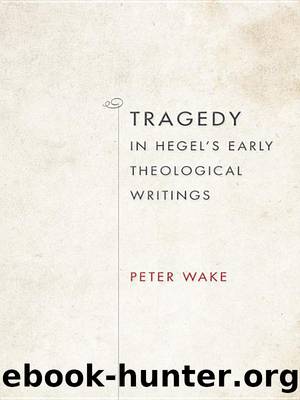Tragedy in Hegel's Early Theological Writings by Wake Peter.;

Author:Wake, Peter.;
Language: eng
Format: epub
Publisher: Indiana University Press
Published: 2014-07-14T16:00:00+00:00
Poetic History
Tragic beauty and the unification of subject and object that is associated with it are ultimately related to sacrifice. Hegel’s view is that the tragedy of the Jews, as the embodiment of the spirit of independence, is born of a perversion of human nature that precludes genuine sacrifice, and, for this reason, he denies to the Jews the status of a Greek tragedy. This view follows from a definition of tragedy that is framed by Aristotelean criteria, broadly conceived: only the “necessary slips” (notwendige Fehltritt) of a beautiful character can evoke the emotions of fear and pity (W 1:297/SC 204–205).51 Because Hegel thinks that the Jews lack the requisite beauty, the tragedy they suffer through inspires horror, rather than fear or pity. Their fate, again, is that of Macbeth, the one “who stepped out of nature itself, clung to alien Beings, and so in their service had to trample and slay everything holy in human nature, had at last to be forsaken by his gods (since these were objects and he their slave) and be dashed to pieces on his faith itself” (W 1:297/SC 205).52 When tragedy is conceived according to Aristotle’s criteria, the failure to evoke fear and pity would seem to entail the failure of the proper aim of tragedy, namely, the catharsis of these emotions. Yet, is the tragic spectacle that evokes horror, rather than fear and pity, simply a failed tragedy, or is it a tragedy of another (modern) order? Can the audience of a spectacle of this kind experience a catharsis of horror, and, if not, what stands in the place of catharsis in the tragedy of Macbeth? Does the violent, and seemingly unending, oscillation that Hegel presents as the fate of the spirit of independence provoke despair, the “despair” (Verzweiflung; PdG 61/PS 49) that Hegel associates in the Phenomenology of Spirit with the loss of self that natural consciousness experiences through the unfolding of its history?53 In the Phenomenology, what comes to relieve the experience of this history of despair is the philosopher’s presentation of the cunning of reason that, despite appearances, structures history itself. In The Spirit of Christianity, what comes to relieve this seemingly unending oscillation born of the spirit of independence is Christianity. Does Hegel, then, think of Christianity as something like a catharsis of horror? Or does the relief intrinsic to this non-Greek tragedy take another form? A response to these questions has to first take into consideration the way in which Hegel understands the relation between history and dramatic narrative.54 That is, a response must consider the fact that Hegel understands the history of a people, and our experience of this history, in terms of tragic, poetic categories.
Despite the cursory nature of Hegel’s reference to the Poetics, it is clear that he is adopting Aristotle’s account of tragedy as a ritual purification, or katharmos, of the emotions of fear and pity, and it also seems that he interprets catharsis in a “subjective” manner. This is an interpretation that
Download
This site does not store any files on its server. We only index and link to content provided by other sites. Please contact the content providers to delete copyright contents if any and email us, we'll remove relevant links or contents immediately.
The Lost Art of Listening by Michael P. Nichols(6474)
Why I Am Not A Calvinist by Dr. Peter S. Ruckman(3771)
The Rosicrucians by Christopher McIntosh(3050)
Wicca: a guide for the solitary practitioner by Scott Cunningham(2705)
Signature in the Cell: DNA and the Evidence for Intelligent Design by Stephen C. Meyer(2501)
Real Sex by Lauren F. Winner(2476)
The Holy Spirit by Billy Graham(2418)
To Light a Sacred Flame by Silver RavenWolf(2354)
The End of Faith by Sam Harris(2291)
The Gnostic Gospels by Pagels Elaine(2027)
Nine Parts of Desire by Geraldine Brooks(2007)
Waking Up by Sam Harris(1958)
Heavens on Earth by Michael Shermer(1955)
Devil, The by Almond Philip C(1900)
Jesus by Paul Johnson(1888)
The God delusion by Richard Dawkins(1848)
Kundalini by Gopi Krishna(1824)
Chosen by God by R. C. Sproul(1761)
The Nature of Consciousness by Rupert Spira(1689)
